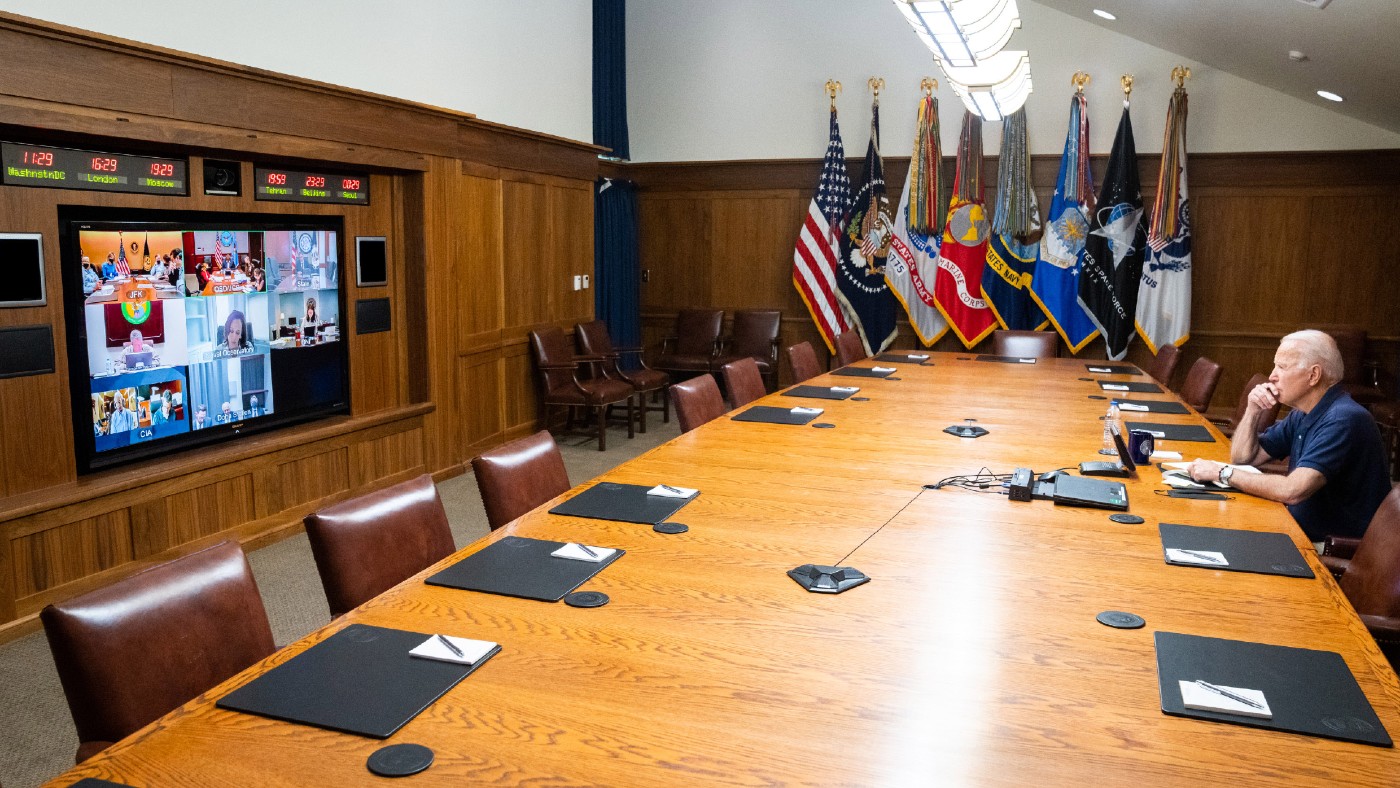Biden’s retreat: the humiliation of a superpower
The chaos in Afghanistan has ‘shredded’ America’s reputation as a global power

A free daily email with the biggest news stories of the day – and the best features from TheWeek.com
You are now subscribed
Your newsletter sign-up was successful
“America’s back,” President Biden grandly declared in his first global address after taking office. Yet on the evidence of the past week, said The Times, that claim could scarcely be further from the truth. The Taliban’s extraordinary capture of Kabul brought to mind the fall of Saigon in 1975. It marks a humiliating end to a two-decade war which has cost trillions of dollars; it will cause the Afghan people immeasurable suffering; and it will heighten the risk of the very Islamist terrorism that the US-led intervention in 2001 was meant to quell. Perhaps most significantly, it represents a comprehensive repudiation by the US of its commitment to “defend liberty abroad”, a principle which has underpinned Western foreign policy for the better part of a century. It’s too soon to say just how damaging Biden’s Afghan withdrawal will be, said The Economist. But “the stench of great-power humiliation” that has pervaded this past week suggests his many boasts about reasserting US leadership after “four years of buffoonery” under Donald Trump are likely to “haunt his presidency”.
And so will the images from Kabul of the “shuttered American embassy”, said Roger Cohen in The New York Times, and of “gun-toting Taliban forces” taking over government buildings that were meant to enshrine an “American-built democracy”. Yet the blame for this “disaster” cannot be levelled at Biden alone. True, the president – like much of the US public – has long doubted the wisdom of America’s continued presence in Afghanistan. But he’d been boxed in by Trump’s decision last year to strike a direct deal with the Taliban, one that excluded the Afghan government, which committed the US to withdrawing by May. If you ask me, said Rod Liddle in The Sunday Times, “getting the hell out” is the right call. In fact, “we should never have gone in”. We in the West may tell ourselves we’re doing good by “bombing the people we do not approve of”, but the overwhelming evidence suggests that our penchant for nation-building invariably “ends up badly for us and even worse for them”. In Afghanistan, that is clearly evidenced by the deaths of 240,000 Afghans, 70,000 of them civilians, since 2001 – to say nothing of the 2,312 US soldiers and 456 British troops who lost their lives there too. We may enter these places hoping to turn them into “nice liberal democracies”. But we can’t, and it’s time we stopped trying to.
Whatever the rights and wrongs of intervention, said Tony Walker on The Conversation, the US’s withdrawal will have consequences far beyond Afghanistan’s borders. Pakistan, which has long supported the Taliban “covertly and overtly”, will take on a more assertive regional role. Russia and China, both of which recently held talks with Taliban leaders, are also likely to engage with the new regime and capitalise on the void left by the US in Central Asia. As for America’s credibility as a guarantor of its allies’ security, well, that has been “shredded”, said Gideon Rachman in the FT. How can Taiwan any longer believe Washington’s promises that it will protect it in the event of a Chinese invasion? Biden may claim America is back, but his decision “fits perfectly” with the contrary message pushed by Moscow and Beijing: “US power is in decline.”
The Week
Escape your echo chamber. Get the facts behind the news, plus analysis from multiple perspectives.

Sign up for The Week's Free Newsletters
From our morning news briefing to a weekly Good News Newsletter, get the best of The Week delivered directly to your inbox.
From our morning news briefing to a weekly Good News Newsletter, get the best of The Week delivered directly to your inbox.
A free daily email with the biggest news stories of the day – and the best features from TheWeek.com
-
 The ‘ravenous’ demand for Cornish minerals
The ‘ravenous’ demand for Cornish mineralsUnder the Radar Growing need for critical minerals to power tech has intensified ‘appetite’ for lithium, which could be a ‘huge boon’ for local economy
-
 Why are election experts taking Trump’s midterm threats seriously?
Why are election experts taking Trump’s midterm threats seriously?IN THE SPOTLIGHT As the president muses about polling place deployments and a centralized electoral system aimed at one-party control, lawmakers are taking this administration at its word
-
 ‘Restaurateurs have become millionaires’
‘Restaurateurs have become millionaires’Instant Opinion Opinion, comment and editorials of the day
-
 How corrupt is the UK?
How corrupt is the UK?The Explainer Decline in standards ‘risks becoming a defining feature of our political culture’ as Britain falls to lowest ever score on global index
-
 Democrats push for ICE accountability
Democrats push for ICE accountabilityFeature U.S. citizens shot and violently detained by immigration agents testify at Capitol Hill hearing
-
 Fulton County: A dress rehearsal for election theft?
Fulton County: A dress rehearsal for election theft?Feature Director of National Intelligence Tulsi Gabbard is Trump's de facto ‘voter fraud’ czar
-
 ‘Melania’: A film about nothing
‘Melania’: A film about nothingFeature Not telling all
-
 Greenland: The lasting damage of Trump’s tantrum
Greenland: The lasting damage of Trump’s tantrumFeature His desire for Greenland has seemingly faded away
-
 Minneapolis: The power of a boy’s photo
Minneapolis: The power of a boy’s photoFeature An image of Liam Conejo Ramos being detained lit up social media
-
 The price of forgiveness
The price of forgivenessFeature Trump’s unprecedented use of pardons has turned clemency into a big business.
-
 The ‘mad king’: has Trump finally lost it?
The ‘mad king’: has Trump finally lost it?Talking Point Rambling speeches, wind turbine obsession, and an ‘unhinged’ letter to Norway’s prime minister have caused concern whether the rest of his term is ‘sustainable’